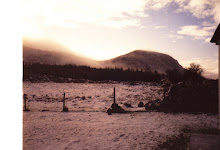By Daniel Greenwood
Release Date: 17/03/2009
Ragged Rating: *** (3/5)
In Three Ragged Words: Metal? What metal?
Up until this point in The Decemberists’ career, Colin Meloy has contained his storytelling into sole songs that are tied together by themes of self-deprecation and melancholia. The results are devastating. Picaresque, released in 2005, was the breakthrough record for the Portland-based band. It’s a record packed with miniature epics that work like short stories and, up until now, Meloy could be seen as a high calibre short story writer presenting his work in song. ‘On the Bus Mall’ is the tale of young prostitutes that ‘fuse together like a family’, while ‘The Engine Driver’ is the lament of someone unloved and strung along: “And if you don’t love me, let me go”. Castaways and Cutouts (2002) is perhaps The Decemberists’ lesser-known release and remains a well-kept secret. It finishes with ‘California One/Youth and Beauty Parade’ as Meloy calls upon all the urchins of society to join the toast of the town, to rejoice in their bedwetting and pick-pocketing.
The characters Meloy creates are forgotten souls, like ‘Eli, the Barrow Boy’: “dressed all in corduroy he had drowned in the river down the way”. Meloy’s narrator embodies the forgotten, reflecting like a ghoul upon the tragedy that has come before; or else he’ll narrate as an outsider, a feeling unfamiliar to the listener. The Decemberists’ music is tuneful and inviting, and before The Crane Wife (2007) it was hard not to love this band. In 2007 there were signs that Meloy’s songwriting was moving towards epic musicianship (two songs surpass the eleven-minute mark) overlooking the mini-epiphanies that define The Decemberists’ earlier work.
So here comes The Hazards of Love, a 17-part tragic romance hyped for its genre hopping from folk-pop all the way over to metal. There are chomping power-chords to be found, as on ‘The Queen’s Rebuke/The Crossing’ but metal it ain’t. It feels more like sea shanty-rock, an evolution of The Decemberists’ previous allusions to pirate-pop. The ‘metal’ is sparse enough, but the teeth crunching guitars feel a little unsavoury. Still, the impression remains that a record aiming for this sort of theatricality needs something pantomime ugly. It’s not unlikely that this new direction for the band will have fans of old chewing their bottom lip in confusion, and if you don’t enjoy the guest vocals (Becky Stark of Lavender Diamond as our heroine, Margaret, and Shara Worden of My Brightest Diamond as the Queen) early on in the album’s lifespan, you probably won’t like them at all.
There are moments of Meloy magic to be had here however, ‘The Drowned’ is the curtain falling on the album, albeit a curtain clawed down by the waves that ‘bear witness’ to our hero and heroine wedded beneath the rushing waters. It’s the saddest song Meloy’s written since ‘On the Bus Mall’ and it’s a suitable finale to a successful decade for this Portland-based band. Hopefully it’s a sign of things to come. May their next project find Meloy crushing listeners with the calibre of ‘The Drowned’, because it feels like all Hazards really needs to say is in this one last song. For now though, The Decemberists have every right to experiment.
